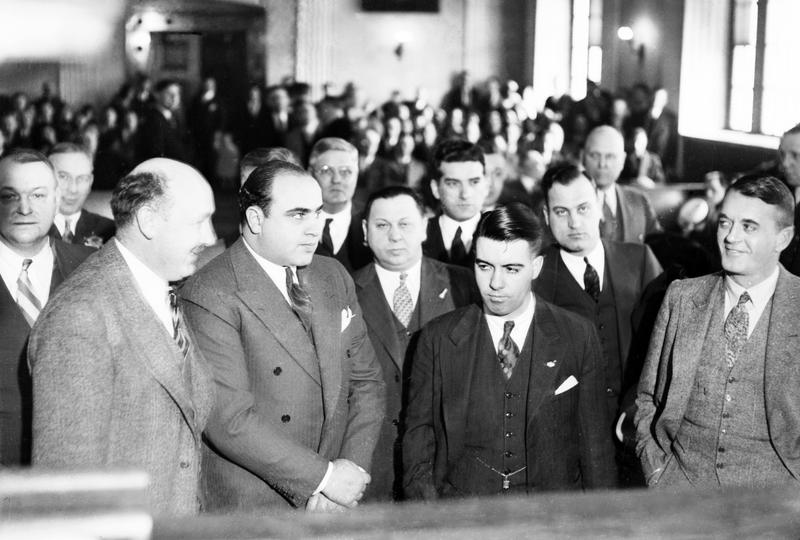Notorious Gangsters of the 1900s
By | December 19, 2018

Gangsters, especially those in the mafia, did not see themselves as breaking the law. In their eyes, they were just protecting their family and their business. Al Capone, for example, considered himself a businessman just like any other businessman.
Al Capone
Born in 1899 in Brooklyn, New York, Capone was part of a large poor Italian family and one of nine children. Dropping out of school in the sixth grade, he began roaming the streets with street gangs and later took a job as a bouncer on Coney Island. He later relocated to Chicago, which was notably worse of a crime area, especially in the Levee District. During the war (World War I), the government banned drinking and started revoking licenses. By 1920, the government passed the “Prohibition” law which made drinking illegal. With the war ending, things began to shift. There were those who wanted to “enjoy” life again with partying and drinking. Capone and his cohort, Johnny Torrio, were happy to oblige them. With legitimate business owners out of the competition, they were able to corner the market. Expanding their bootlegging “business” to include other cities, they eventually had a connected underground network.
Seeing himself as a big fancy businessman, Capone was totally shocked when he was arrested for tax evasion and received a sentence of 11 years. Other members of his gang had received only two to three years for the same thing. The jury had been handpicked by the judge who wanted to make an example of him, so they “threw the book at him.”

Lucky Luciano
Lucky Luciano was born in Sicily, Italy in 1897 and was quite instrumental in helping to bring about the national crime Syndicate almost single-handedly. Moving to Manhattan with his family at the age of 10, he was quickly recruited into gang life. Like Capone, he got started around 1920, when he was recruited as a gunman, working for first Masseria and then Arnold Rothstein. With bootlegging profits, he was making millions by the mid-1920s.
When Rothstein was murdered in 1928, Luciano returned to work for Masseria; but when a gang war broke out between Masseria and Maranzano, he was not loyal to Masseria. In fact, he set up his assassination in 1931. With no loyalty in the mafia, Luciano also betrayed Maranzano and assisted in having him “knocked off.” The committee of the Five Families established by Maranzano then fell into Luciano’s waiting hands which was later renamed to "The Genovese Family." A few years later, his leadership came to an end in 1936, when he was arrested, convicted, and sentenced to 30 to 50 years. Luciano turned over his leadership to Frank Costello. Sometime later, striking a deal with the government, he was eventually deported back to Italy where he later died in 1962 of a heart attack.

Frank Costello
In Italy in 1891, “Uncle Frank” Costello was born as Francesco Castiglia. Moving to Manhattan in 1895, he got involved in the same gang that Lucky Luciano did. From 1908 to 1918, he was arrested for assault, robbery, and weapons possessions four different times. When he got married, he was determined not to ever carry a gun again and he successfully avoided jail for the next 40 years. Like Capone and Luciano, he also got involved in the bootlegging racket. After Luciano became the leader of the “Commission” of the Five Families, Costello became his top adviser. He helped Luciano to expand their operation to Louisiana, bringing in slot machines. Before Costello was left in charge of the Five Families, Vito Genovese was in charge but only until he was arrested on murder charges and fled to Italy. Eventually, he was taken back to New York to face the charges but when witnesses were murdered, he was released and wanted control back from Costello. He did get control back when; in 1957, he ordered a hit on Costello. Even though the shot in the head did not kill him, it was too close for comfort for him so he relinquished control. Costello later died of natural causes in 1973.

Carlo Gambino
Born in 1902, in Palermo, Sicily, “The Godfather,” Carlo Gambino was a teenage hitman in Sicily and came to the United States in 1921 at age 19 to become part of the Mafia. He went to work for his cousins, already connected to gangs in New York, specifically “Toto” D’Aquila. After D’Aquila was killed by Masseria in 1928, Gambino became part of the Masseria gang and later became a member of one of the five crime families that belonged to Vincent Mangano. In 1951, Mangano and his brother were killed by order of their underboss, Anastasia. Six years later, Gambino ordered the murder of Anastasia and took control, which he held for the next 19 years. In 1976, he died of heart problems in his home and left the leadership to his brother-in-law, Castellano who later was murdered by order of his underboss’s pupil, Gotti.

Bugsy Siegel
Born in 1906 in Brooklyn, New York, Benjamin “Bugsy” Siegel grew up in New York but ended up in California. He got his nickname from fellow gang members who said he was as crazy as a bedbug. Siegel left the gang “Bugs and Meyer” that he had established to work for Luciano as it was known that Luciano’s enemies would die rather violently. It was speculated that Bugsy had a hand in the death of Masseria but that was never proven. Due to Bugsy’s violent nature, murders have been pinned on him that may not have been committed by him. This was why he relocated to the West Coast. With his accumulated wealth, he was able to establish operations there. Dating actress Virginia Hill, he took over construction of the Flamingo hotel but the price was too high. Over budget, the mob who were financing it were not happy. That, along with other possible motives, brought about the incident that took place in June of 1947, when gunfire came through Bugsy’s girlfriend’s living room window, striking him several times with two fatal shots to the head. His death is still an unsolved mystery.

